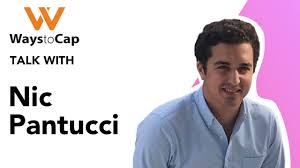Entrepreneurs from Africa are making good use of technology to get solutions to international and local problems. From creating a text-based ordering system for small stores to enable African traders to better trade across borders to easing global shortage computer scientists, tech-savvy African startups are making a real social impact. The startups are placing the continent on the global startup map and will act as an inspiration to others to emulate what they are doing. Wamda took a close look at three startups and how they have contributed to the African entrepreneurial scene.
Nic Pantucci, co-founder of WaystoCap

WaystoCap startup focuses on the B2B marketplace with the aim of taking on traditional international traders that depend on insider knowledge and opaque pricing. It’s a trading site that allows African small businesses buy and sell globally. The company started its operations in 2015 with Niama El Bassunie serving as its CEO. The Casablanca based startup is the first startup from Morocco to be supported by Y Combinator and renowned investors from Silicon Valley. The startup received the Tech Pioneer recognition from the World Economic Forum making it the first ever North African startup to receive the award. According to Pantucci, the startup aims at bringing transparency, efficiency, and sustainability to Africa trade. The startup does that by developing a trusted environment in which users can buy and sell goods. He added that partnering with Bureau Veritas, Ecobank and Coface gives them a chance to offer small and big firms necessary tools to attain their objectives. Pantucci said that the platform is operational in 11 African countries and it is planning to open others soon.
Seni Sulyman, vice president worldwide operations at Andela
 Sulyman said that the world has a shortage of software engineering skills. The US alone has a total of 1 million jobs related to computer science which have remained vacant every year from 2015. Firms also struggle to get the quality staff they want. Here is where Andela comes in to assist solving the problem by hiring the most outstanding software developers in the continent and connecting them with firms looking for employees. Andela was founded by six technology professionals that is Brice Nkengsa, Jeremy Johnson, Ian Carnevale, Nadayar Enegesi, Iyinoluwa Aboyeji, and Christina Sass.
Sulyman said that the world has a shortage of software engineering skills. The US alone has a total of 1 million jobs related to computer science which have remained vacant every year from 2015. Firms also struggle to get the quality staff they want. Here is where Andela comes in to assist solving the problem by hiring the most outstanding software developers in the continent and connecting them with firms looking for employees. Andela was founded by six technology professionals that is Brice Nkengsa, Jeremy Johnson, Ian Carnevale, Nadayar Enegesi, Iyinoluwa Aboyeji, and Christina Sass.
Moreover, it has a mix of professional experience and nationalities. Founded in 2014, Andela has managed to connect more than 1,100 employees after vetting more than 70,000 applicants within six weeks. Successful applicants take six months training with the startup. Recently, female gender made 26% of the successful applicants bypassing the global average for such jobs that stands at 7%. The employees have an average age of 25 years, and 80% of them have degrees in computer science. Sulyman added that they have offices in New York, San Francisco, Kampala, Nairobi, and Lagos. He added that they have managed to secure funding worth $80 million from investors such as Spark capital and GV (previously referred to as Google Ventures).
Their latest funding round came from Chan-Zuckerberg initiative in 2017 worth $40 million. The startup’s main mission is to promote human potential by empowering today’s team and investing in tomorrow’s leaders. He said that their main purpose is to have a more equitable and prosperous world by mentoring the next generation of tech leaders who will build a better tomorrow. The startup targets to impact a huge number of its 7 billion peers to contribute to the future meaningfully.
Daniel Yu, the founder and CEO of Sokowatch
He used to stay in Egypt as part of the college exchange when he realized that small shops lacked a service for ordering their stock. He went back to the University of Chicago and returned with the idea of allowing retailers to order goods by text message. He took part in a startup challenge and won funding and a prize that allowed him to start working on the idea. Yu said that they had a lengthy talk with Wrigley and paid them a courtesy call at their Kenyan offices Wrigley was moved by the idea and promised to use the technology in case they put up their operations in Kenya. They set up an office in Kenya after three weeks.
Yu admits that the journey has been a bumpy one. Their biggest challenge according to him was deciding on the model of business. They started as a software firm purely a tech company. The software allows shops to make orders and distributors work on the required deliveries after receiving the order. Distributors then pay back for using the platform. The business model did not see the light of the day, and it took them some time before coming up with something new. They realized that distributors were not ready to pay for using the platform. Neither were they interested in delivering to small businesses. From that downfall, they developed their delivery network combining it with their technology.
They now get shop orders through text and an application. However they do not rely on distributor’s delivery but instead, use their network. The new idea has been a success. The startup works with the kiosks in the streets. By now 3,000 shops in Kenya and neighboring Tanzania are using the platform working with 12 distributors. Cleaning supplies, cooking oil, soap, flour, and rice are the most ordered items from the platform. Yu added that the profit manages to make profit fro each delivery and plans are there to expand to other East African cities.
Plans are there to have fundraising and close the next round before the end of August. The startup secured $1.3 million from angel investors from the US, and it also has few Kenyan and European investors. The platform is made up of 7 people and getting talent has been challenging more so to a tech startup looking for specific skills. Very few have the required experience. Yu added that they have a good rate of staff retention and the whole team is local. A lot of them began as delivery drivers and later on got an opportunity of becoming part of the startup’s operations and client team. The startup also continues to work with new manufacturers offering its customers new offerings and products.






